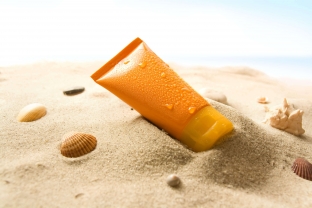There are many myths associated with the action of the mysterious SPF factor, and in general it raises many questions. They try to multiply and divide the treasured numbers of the protective coefficient in order to determine the amount of guaranteed safe time under the hot resort sun. Sunscreen is applied in thick and thin layers, selected by ingredients and scent, price and water resistance. What qualities of a sunscreen are really important for protecting against active sunlight, and how to correctly take into account the SPF factor before going outside on a hot day, we deal with estet-portal.com.
What factors are important for skin in sunscreen
Two types of filters can protect the skin from active radiation in sunscreen – physical and chemical. The essence of the physical filter is the refraction and absorption of sunlight falling on the skin. The elements that provide such protection will be labeled on a jar of sunscreen as zinc oxide, titanium dioxide. They do not penetrate the skin, do not break down in the sun, and can absorb harmful ultraviolet light throughout the day.
The disadvantage of such filters is the fact that sunscreen with their content should be applied in a thick layer – at least 25 ml per body at a time. Few people like to walk, say, around the city with a face thickly smeared with white cream.
Another kind of security filter – chemical. In the composition of sunscreen, substances that provide a protective effect are referred to as avobenzone, octocrylene, para-aminobenzoic acid, octyl salicylate, and others. They give a cream or skin care cosmetics a light texture and a pleasant smell, even 1% of such components in a cream absorbs so much UV that the product can provide protection at SPF 40-45.
However, the remarkable properties of the chemical filter are only maintained for two hours in total spent in the sun. The ingredients are then broken down into free radicals, which can be even more damaging to the skin than the sun's rays.

Sunscreen with a chemical filter should be thoroughly removed and reapplied every two hours of sun exposure.
How to use sunscreen properly to protect your skin
First of all, it is important to decide how and where you will spend your day, and how much the skin will suffer from the sun. If the sun's rays hit the skin exclusively in the city, on the way to the office and back, choose cosmetics with a chemical filter and SPF 50.
Those who often suffer in transport, where the sun is hot through the window, it is recommended to look for sunscreen from infrared rays, since the glass will absorb ultraviolet radiation, but will not protect against possible pigmentation.
If you drive with the window open or use your bike, try to find a sunscreen that combines physical and chemical filters.
In order to reliably protect the skin from the active sun in urban conditions, it is recommended to apply various products, for example:
- day cream,
- protective product with SPF factor,
- tone with SPF or BB cream,
- mineral powder with SPF.
Such a consistent layering of different cosmetics will allow you to achieve protection of approximately SPF 30 and at the same time not scare others with a thick mask on your face.
Things to remember when applying sunscreen
If a 100 ml jar of sunscreen lasts you for a couple of days, then you are using it correctly, and the skin will be well protected from harmful rays. Keep in mind that even if the product says that it is waterproof, sea water will still partially wash away the filter particles, dissolving the base of the cream. Therefore, after bathing, wiping with a towel, you need to apply the cream again. Even just lying on the sand still leads to peeling of the skin – along with sunscreen applied on it.
If kernel oil is present along with titanium dioxide, the SPF factor will be greatly reduced, since such oils change the ability of the particles of the physical filter to refract light. But mineral oil, on the contrary, increases the ability of the product to absorb ultraviolet radiation. That is why children's sunscreens use mineral filters – they do not penetrate the skin and perfectly protect it from the active sun.






Add a comment